Best Google Analytics (GA4) Alternatives in 2024
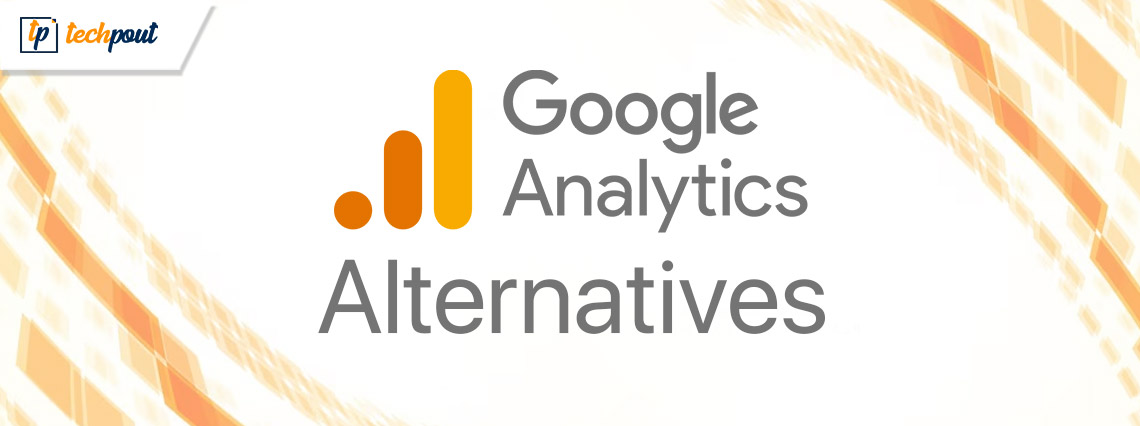
Google Analytics is a tool millions of website and application owners trust to understand how their website or app performs, fine-tune their digital strategy, and optimize the campaigns to boost their online presence.
However, despite being backed by none other than Google (where websites and apps strive to rank), this analytical instrument has a few notable limitations, availability of only sampling data (that does not give an unbiased and comprehensive picture of your performance), a steep learning curve, non-availability of raw data, hits limited to 10 million a month, and privacy compliance issues being the most prominent. All these gaps in GA4 pave the way for the Google Analytics competitors to shine through.
Many marketers and businesses have already found a perfect website analytics tool for their requirements to dive deeper into their lead and customer journey, SEO performance, complete performance analysis, and everything in between. However, if you are still figuring out the tool to use instead of Google Analytics, this article is here to help you choose the right one.
We have deeply researched and compared all the available tools with Google Analytics to list the best ones in this article. Let us walk you through the top alternatives to Google Analytics prepared exclusively for our readers.
Well-Researched List of the Best Google Analytics Alternatives
You can track and optimize your website for growth using the following paid and free tools like Google Analytics that perfectly make up for all the shortcomings of GA4.
1. Plausible Analytics
If you are looking for an easy-to-use, lightweight, and open-source Google Analytics alternative, please pause to try Plausible Analytics. This simple analytics tool is easy to set up and integrate with popular content management systems, such as WordPress, Squarespace, Weebly, Ghost, and Wix.
Moreover, integration with Search Console, an option to import your Google Analytics stats, a proxy setup option to serve the tool’s script from your domain name as a first-party connection (ensuring accurate stats), and the following features make Plausible Analytics a fierce Google Analytics competitor.
Key features of Plausible Analytics
- You can use UTM tags to tag your paid ads, emails, and social media posts to analyze your e-commerce and marketing campaigns
- Plausible Analytics is renowned for its GDPR and other regulations compliance and cookieless tracking
- The code snippet of this tool is quite small, reducing the impact on the loading time of your website
- You can retain complete data ownership with Plausible Analytics
- It allows you to mix and match filters, click on a metric to filter your dashboard by the metric, and get weekly and/or monthly email and Slack reports to keep an eye on your traffic
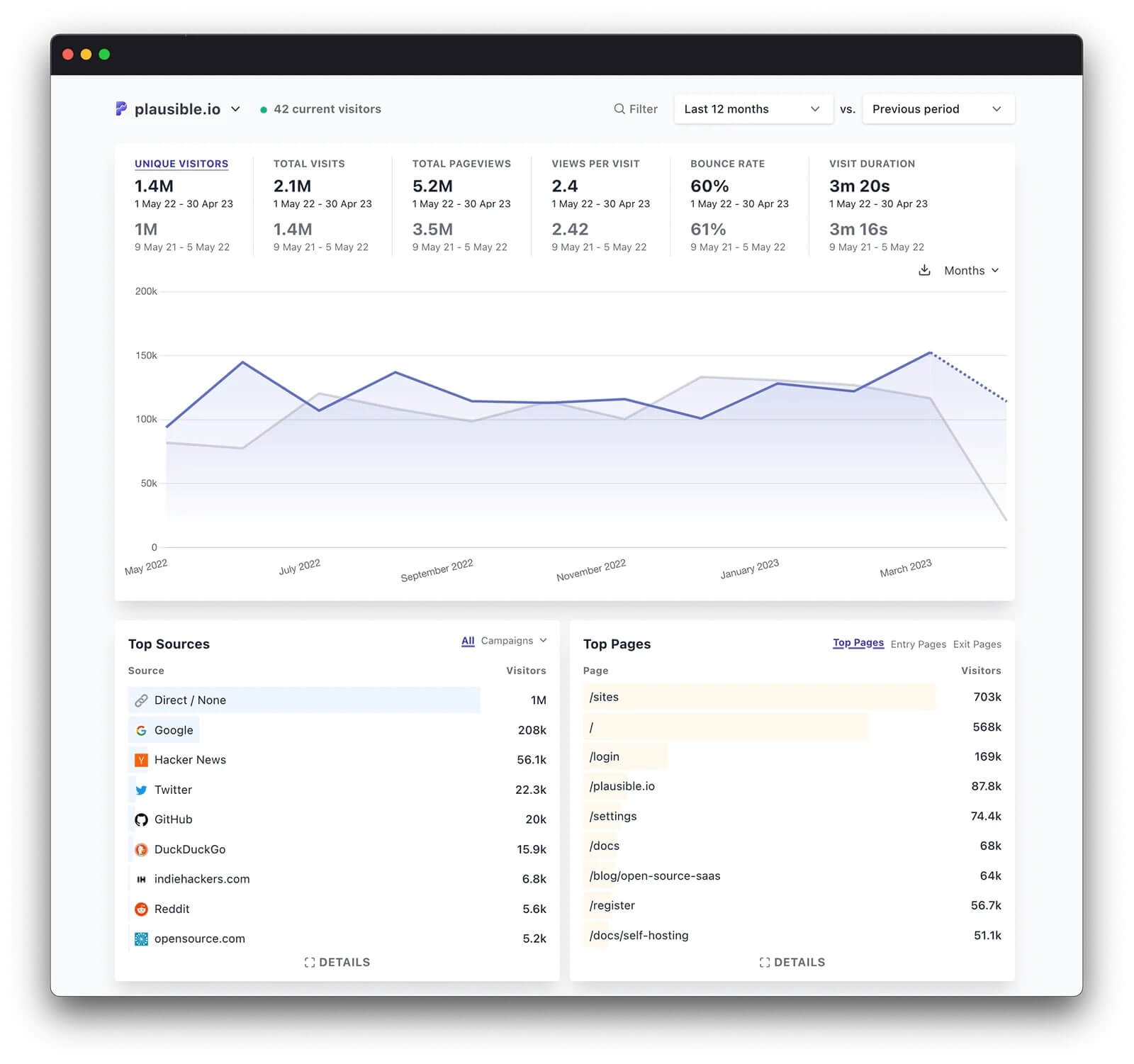
Click here for more information
2. Fathom Analytics
Here is another privacy-focused and fuss-free alternative to Google Analytics. With the ability to track data from people who use ad-blockers or clear cookies, Fathom tracks pageviews, UTMs, custom events, and other basic analytics data. You can view all this information in a single dashboard, making this tool a lot simpler and more user-friendly than Google Analytics.
Additionally, an in-built Google Analytics importer, unlimited retention of data for websites, domains, and reports, and the following notable features help Fathom win the Google Analytics Vs Fathom battle.
Key features of Fathom Analytics
- It fully complies with the ePrivacy, GDPR, CCPA, PECR requirements, and EU standards
- You can use Fathom to get real-time metrics of website performance
- Fathom automatically blocks bots, crawlers, and DDoS attacks to show only human data
- This tool’s script is less than 2kb and won’t slow your site down
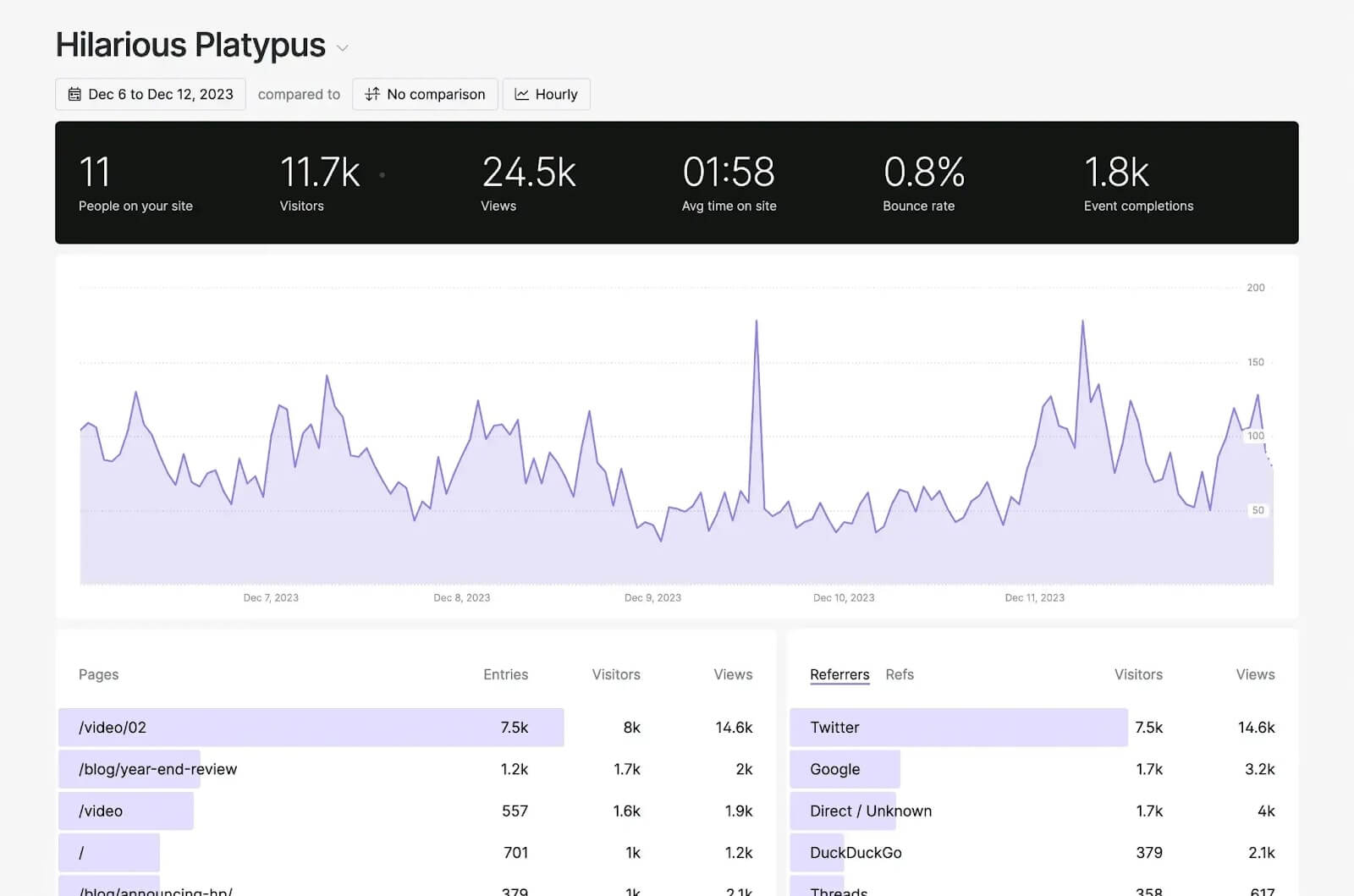
Click here for more information
Also know: Best Ways to Test Your Website Speed for Better Ranking
3. Heap
Next, we have Heap on our list of the best Google Analytics alternatives to help you thoroughly understand your customers’ journey to improve your user experience, conversion, and retention. The most likable thing about this tool is that it has an AI CoPilot, making analytics easy for beginners.
In addition to easy onboarding, Heap automatically captures all event data with a single snippet, offers built-in Heatmaps and Session Replays, provides you with real-time reports, and offers the following remarkable features.
Key features of Heap
- It is known for its cutting-edge reporting and segmentation capabilities
- Unlike Google Analytics, you do not need to know in advance the events you want to track with Heap
- Heap is a fully GDPR-compliant tool
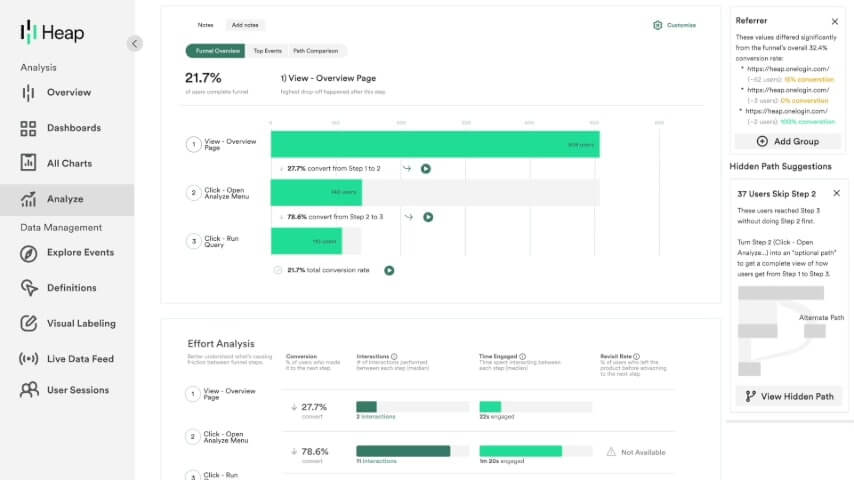
Click here for more information
4. Leadfeeder
If finding companies or users already visiting your website and converting them into high-value leads is your main goal, you can try Leadfeeder. It helps you uncover your hidden leads by identifying the names of companies that have visited your site and discerning their exact behavior.
Moreover, Leadfeeder lets you sync the identified leads to your CRM (for example, Salesforce) and find the web pages they find the most interesting. Furthermore, below are some other features that make Leadfeeder a Google Analytics competitor.
Key features of Leadfeeder
- It has many downloadable guides, ebooks, and live webinars to help you understand how to make the most of this tool
- You can use API or plug-and-play connectors to get Leadfeeder information in other analytical tools like Zapier
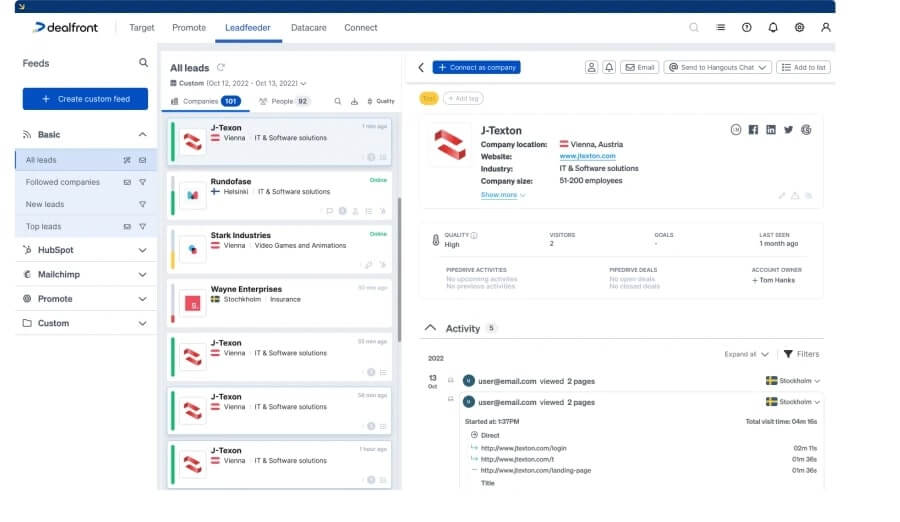
Click here for more information
5. Semrush
One of our favorites, Semrush is an all-in-one SEO, content marketing, competitor research, PPC, and social media marketing platform. The traffic analytics tool of this software gets into the depths of web analytics with useful information, such as total website visits, the number of unique visitors, average visit duration, pages viewed per visit, device data, and bounce rate.
In addition to traffic analytics, you can perform backlink analysis, and keyword research, and understand the content gaps with Semrush. Moreover, the following features contribute to making Semrush a better alternative to Google Analytics.
Key features of Semrush
- It helps you with complete competitor analysis by providing details, such as competitors’ keywords, traffic trends, and more
- The audience overview offers a detailed demographic breakdown of who makes up your website’s audience
- You can use Semrush to identify brand preferences, and user interests, and track the traffic journey of every user
- Semrush is a GDPR-compliant tool
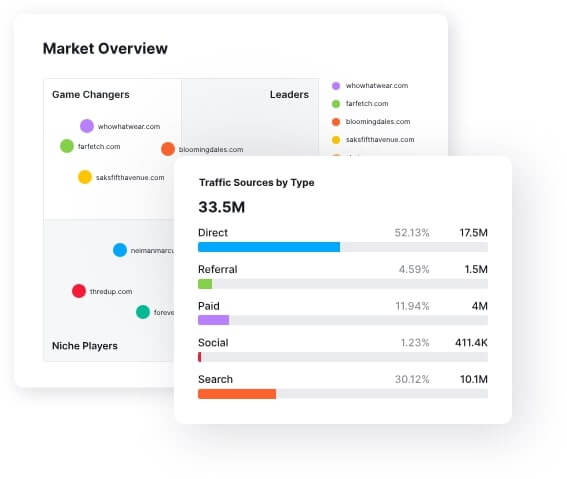
Click here for more information
6. Matomo
Your search for the top open-source Google Analytics alternatives with no data limitations and 100% data ownership may end with Matomo. This tool boasts SEO keyword reporting, session recordings, heatmaps, A/B testing, and all other standard Google Analytics features.
Moreover, easy dashboard customization for data visualization, a wide range of plugins to meet your specific requirements, and the following noteworthy features make Matomo one of the best competitors of Google Analytics.
Key features of Matomo
- It provides comprehensive e-commerce analytics reports, allowing you to track revenue, sales, and conversion rates
- You can import your data from Google Analytics to Matomo
- Unlike Google Analytics, Matomo offers on-premise self-hosting option
- It offers complete form and content analytics
- You can integrate Matomo with Bing and Yahoo search consoles
- It allows you to track your website’s users with log analytics
- Matomo provides unsampled reports to ensure data accuracy
- This tool is CCPA and GDPR-compliant
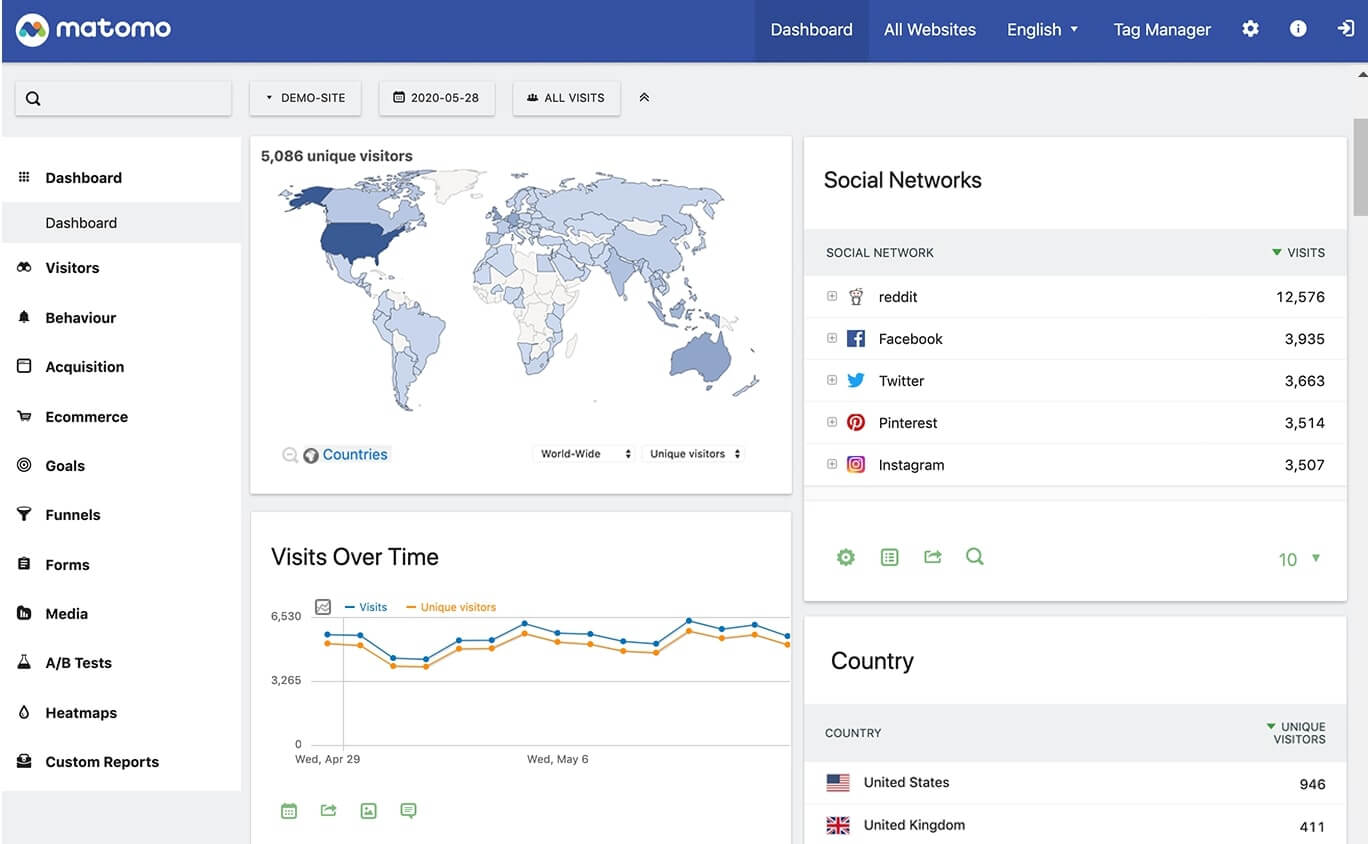
Click here for more information
7. Clicky
Clicky, another web analytics tool, wins the Google Analytics Vs Clicky competition because of its real-time traffic monitoring and analysis, focus on privacy (with GDPR compliance), automatic bot detection and blocking, and uptime monitoring from seven locations across the globe. Additionally, backlink analysis, heatmap tracking, and the following are other reasons for including this tool in our list.
Key features of Clicky
- You can customize Clicky to fit your needs with advanced filtering
- Clicky lets you comprehensively track all actions by a single visitor
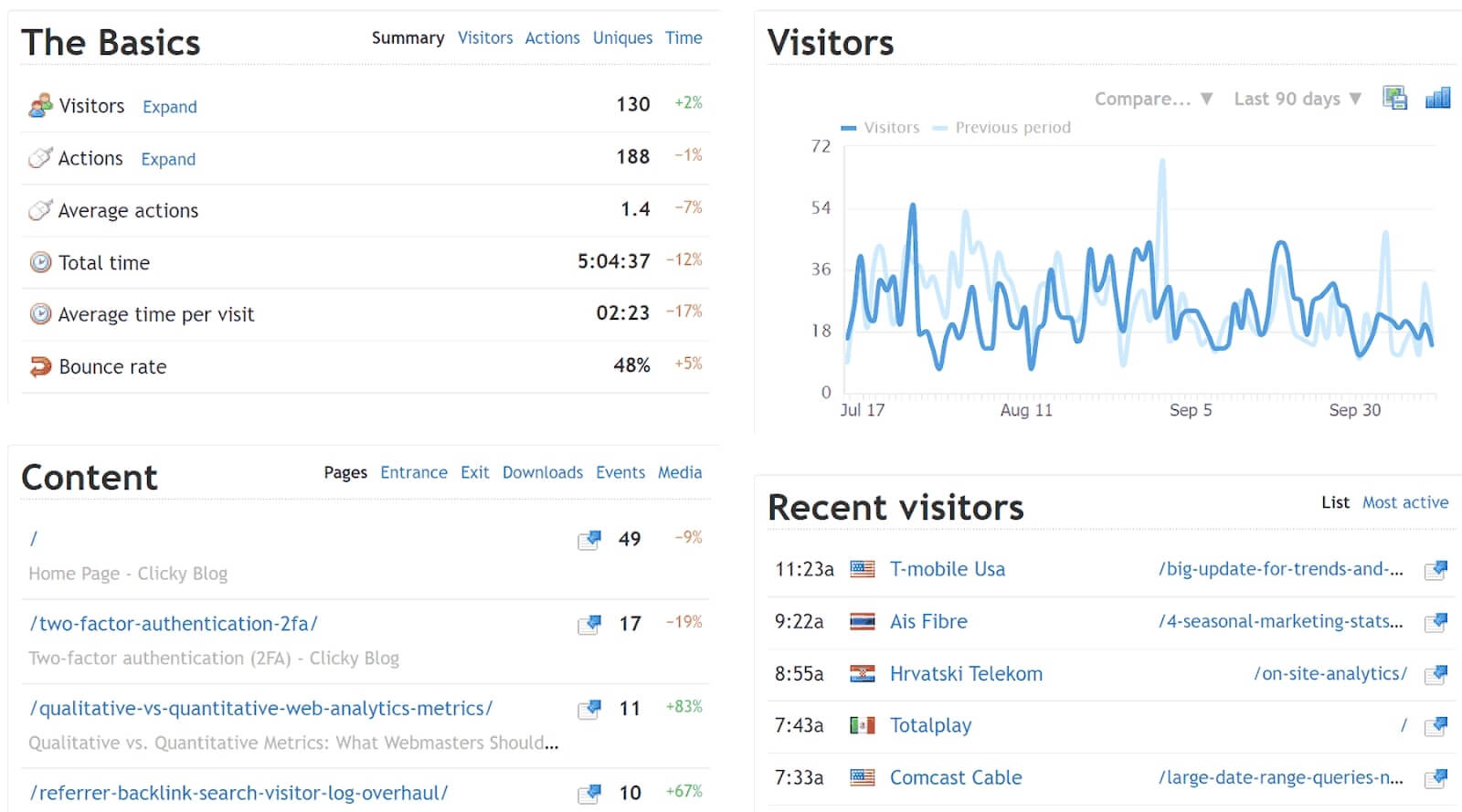
Click here for more information
Also know: Best SEO Techniques to Drive Organic Traffic
Concluding the Best Google Analytics Alternatives
In an increasingly competitive landscape, where competitors try to pull you down from all sides, surface-level web analytics is only of little help. You need an in-depth website and user analytics to beat the competition and reach the height of success.
Hence, you can switch to the best alternatives to Google Analytics above with a deep insight into all metrics a modern-day business or marketer may require to create fail-proof digital marketing strategies. And, keep returning to our blog for more software recommendations and tips to thrive in the technological world.


